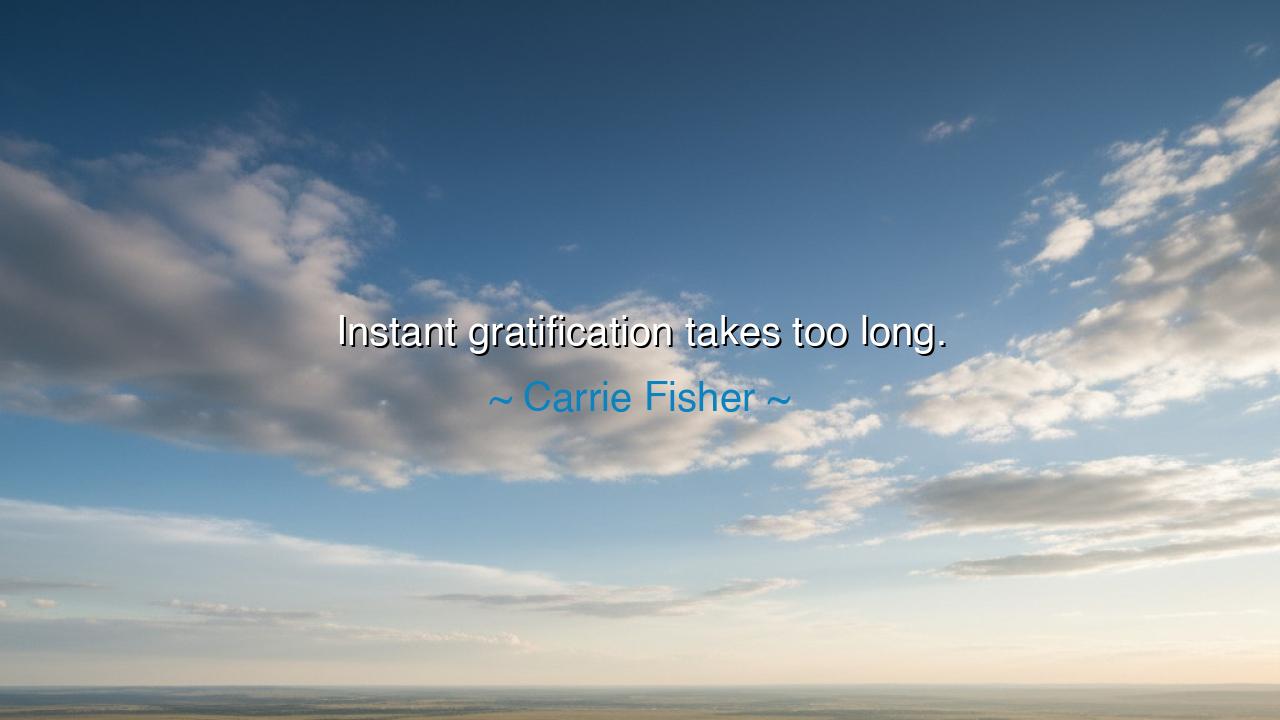
Instant gratification takes too long.






"Instant gratification takes too long." These words, spoken by the legendary Carrie Fisher, echo through the corridors of time as a biting commentary on the nature of impatience and the fleeting nature of our desires. In this age, where every whim can be satisfied at the touch of a button, we have grown accustomed to immediate rewards, often at the expense of deeper, more meaningful fulfillment. Carrie Fisher, with her characteristic wit, captures the irony of our times — that in a world of instant gratification, we have somehow lost the art of waiting, of truly earning our rewards.
The ancient sages knew well the power of patience. In their teachings, they spoke of the need to endure, to persevere through hardship, and to seek wisdom through trials and tribulations. The wise Confucius taught, "It does not matter how slowly you go as long as you do not stop." And yet, in our modern world, where the illusion of instant satisfaction reigns supreme, we find ourselves constantly chasing after fleeting pleasures, only to discover that the hunger for more never truly subsides. The very notion of waiting — of allowing time to unfold — has become foreign to us.
Consider, if you will, the story of Hercules, the great hero of Greek mythology, who faced twelve arduous labors, each more difficult than the last. His strength was tested not by how quickly he could achieve his goals but by his endurance and persistence. Had he sought instant rewards, had he allowed his desire for gratification to govern his actions, he would have failed before his final triumph. His story teaches us that true accomplishment is earned through effort, through sacrifice, and through the willingness to face the trials that come our way.
The impatience that Carrie Fisher speaks of has roots deep in the human spirit. Throughout history, those who have sought quick rewards without understanding the deeper cost have often found themselves empty, their accomplishments hollow. The emperors who built grand palaces, the kings who amassed great wealth — many of these figures sought immediate gratification, only to find themselves faced with emptiness, for they had not earned their peace or their wisdom. Alexander the Great, with all his conquests, still died a man yearning for something more, something that instant gratification could never give him.
In our own lives, we too must confront this hunger for immediate fulfillment. The modern world has provided us with technologies that cater to our every whim, from the instant reply of a text to the rush of a "like" on social media. Yet, much like the mythical fool's gold, these pleasures are not the treasures they seem. They are temporary, fleeting, and ultimately unsatisfying. True richness in life is found not in the quick rewards but in the long, often difficult journey toward meaningful goals. It is the act of delayed gratification that builds the resilience, the strength, and the depth of character we seek.
Consider the tale of Mahatma Gandhi, a man who understood the power of waiting and of acting with purpose. For years, he led his people in peaceful resistance against colonial oppression. He did not demand immediate results but instead worked tirelessly, knowing that true change required patience, sacrifice, and steady resolve. His actions remind us that greatness is not born of instant gratification but of dedication to a cause, a willingness to endure hardship for the greater good.
So, in the wisdom of Carrie Fisher, there lies a lesson for us all: Instant gratification, while seductive, is ultimately a thief, robbing us of the deeper rewards that come only through patience, perseverance, and time. Let us remember the words of Marcus Aurelius, who wrote, "The impediment to action advances action. What stands in the way becomes the way." The lesson is clear — if we seek true fulfillment, we must resist the pull of quick rewards and instead embrace the delayed, the earned, and the meaningful. Only in this way will we find the peace and satisfaction that the world cannot provide.






AAdministratorAdministrator
Welcome, honored guests. Please leave a comment, we will respond soon